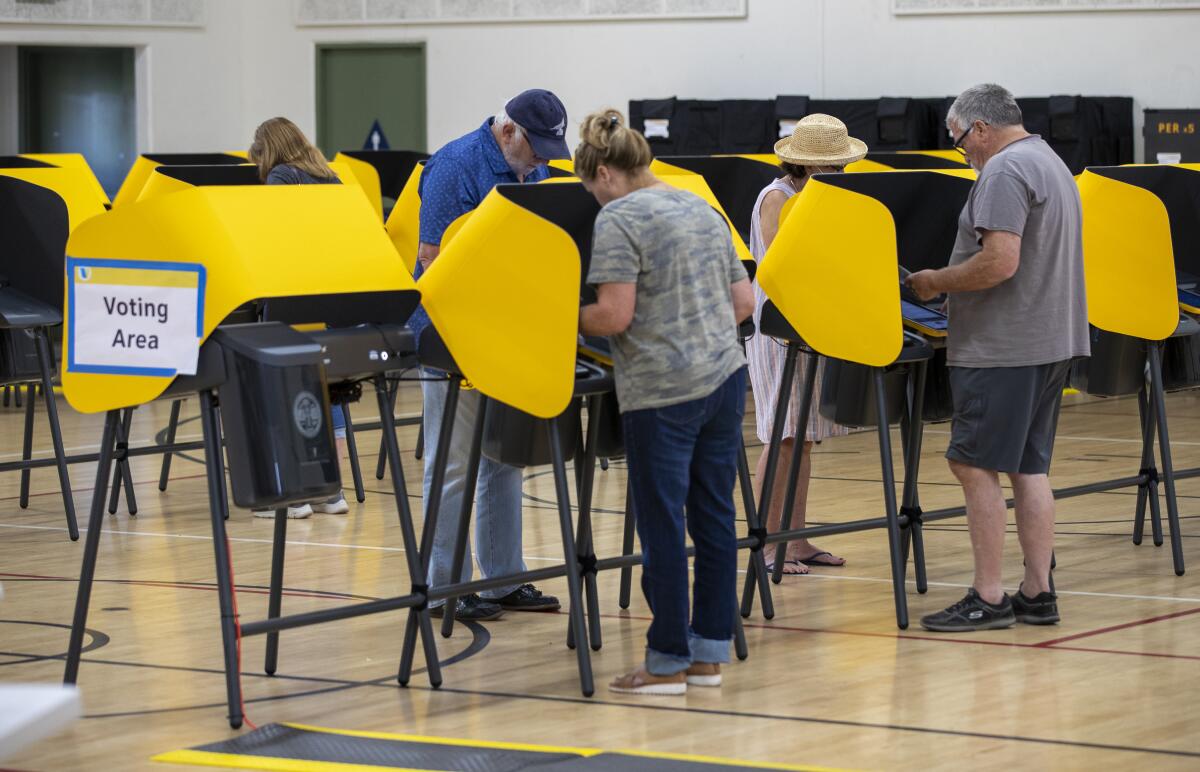Riverside County’s new supervisor districts diminish Latino voting power, suit says

- Share via
Civil rights groups have filed a lawsuit alleging that Riverside County’s new voting districts disenfranchise Latino voters.
The ACLU Foundation of Southern California, local advocacy group Inland Empire United and five residents filed the lawsuit Tuesday in Riverside County Superior Court.
The group is alleging that the county’s new supervisor districts, adopted in December, violate state redistricting laws. The group is seeking a court order that would require the county to adopt a new voting district map. The lawsuit was filed against Riverside County and its five-member Board of Supervisors, as well as the county’s registrar of voters.
“For months, Riverside residents demanded the county to do the right thing and adopt maps that would lead to equitable and fair representation,” Michael Gomez Daly, executive director of Inland Empire United, said in a news release. “Instead, the supervisors ignored the community and adopted maps that would ensure they had easier reelections.”
About half of Riverside County’s 2.4 million residents identify as Latino, but Latinos are only reflected in one member on the county’s Board of Supervisors, the lawsuit says.
Cheech Marin started collecting marbles and baseball cards as a kid. Now, he has the Cheech to exhibit his collection of Chicano art in Riverside.
As county representatives and community members deliberated over new voting maps in 2021, the map that was eventually adopted split the several Latino-dominant areas into separate districts. Those include Latino communities near Jurupa Valley, Moreno Valley and Perris, which all sit in separate voting districts under the new map, the lawsuit says.
The supervisors rejected a community-drafted map called “Community map 1.4” that would have created two Latino-majority districts, the lawsuit alleges.
“Instead, the board adopted an incumbency-protection plan that splits up Latino communities of interest and only includes one Latino-majority district,” the complaint states.
The county maintains that its new district map is compliant with federal and state laws and includes two districts that are “Latino opportunity-to-elect districts,” said spokeswoman Brooke Federico. She said those are the county’s District 1 and District 4, which cover the city of Riverside and the eastern half of the county, respectively.
“The county went through a rigorous statistical analysis by well-respected experts and consultants to ensure that all voters have a meaningful opportunity to elect the candidates of their choice,” Federico said in an email.
UC Riverside and UC Merced enroll the highest share of low-income students of color in the UC system. Legislation aims to help them succeed with more funding.
The new voting maps drew controversy last year when three Latino state Assembly members representing the region cried foul over the county’s proposed redistricting maps. Assembly members Sabrina Cervantes (D-Riverside), Jose Medina (D-Riverside) and Eduardo Garcia (D-Coachella) released a joint statement in October 2021 objecting to the new maps.
“These proposed maps were drawn with a clear intent to protect certain incumbent supervisors and dilute the influence of Latino voters,” the joint statement said, as originally reported by the Press-Enterprise.
The new district maps were used in last week’s primary election, in which three county supervisors ran for reelection. Two of the supervisors, V. Manuel Perez and Karen Spiegel, ran unopposed, and incumbent Jeff Hewitt is set to go into a runoff against Yxstian Gutierrez, the mayor of Moreno Valley.
If the plaintiffs win their lawsuit, the 2022 elections would not be voided, representatives from ACLU Southern California told the Press-Enterprise.
In 1990, 86% of Latinxs lived in just nine states. By 2020 that percentage had dropped to 73%.
More to Read
Sign up for Essential California
The most important California stories and recommendations in your inbox every morning.
You may occasionally receive promotional content from the Los Angeles Times.

















